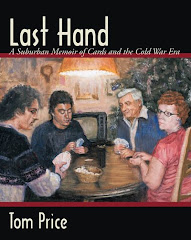The description of the exhibit seemed to fit well with the theme of my book:
“Throughout our community’s history many businesses, homes, schools, and other public spaces have been razed, or become victims of age. Our sense of community is often tied to these locations, which now reside only in our memories. Every now and then it is important to revisit these places in order to help us understand where we are today. Progress has changed Arlington Heights since it was first called Dunton in 1854, and progress will continue to shape the future of our community.”The book Last Hand: A Suburban Memoir of Cards and the Cold War Era isn’t really meant to be a history of Arlington Heights but rather the story of a changing community, culture, and country. The story also details the transition from city life to suburban life as the family moves from Chicago to Suburbia.
The family’s move in the early 1960s coincided with a major shift in history of Arlington Heights as the village was evolving from a small town outside of Chicago to one of the city’s fastest growing suburbs. In the chapter “The New Suburbia” I write about the changes taking place northwest of Chicago. During the late 50s and early 60s a number of towns became full blown suburbs of the city. It was during that period that Arlington Heights grew 640% from its 1950 population of 8,768 to its 1970 population of 64,884. The growth changed Arlington Heights and the face of the community.
The time period described in the book was a unique as the small town atmosphere blended with the newly developed land. The subtitle to the book “A Suburban Memoir of Cards and the Cold War Era” is very fitting. Life in the “New Suburbia” was new and fresh, yet cultural life remained open and free for the kids growing up in the area. Some elements of small town life remained such as family owned businesses and shops adding to the positive flavor of small town life to the experiences of the new suburban kids. Time, of course, would change all of that.
Shortly after the book was released an old friend and classmate of mine Bill Westfall contacted me with a sort of treasure. An old neighbor of his had kept some of the original marketing material from Miller Builders (the developer who built Greenbrier as detailed in the book) and had given Bill’s parents the material when they moved away. Below are elements of that material that capture the “New Suburbia” feeling. The material comes from about the mid-point in the subdivision’s development (1965-66 timeframe). I will post some more in the days to come. Click on the images for a closer view.





No comments:
Post a Comment